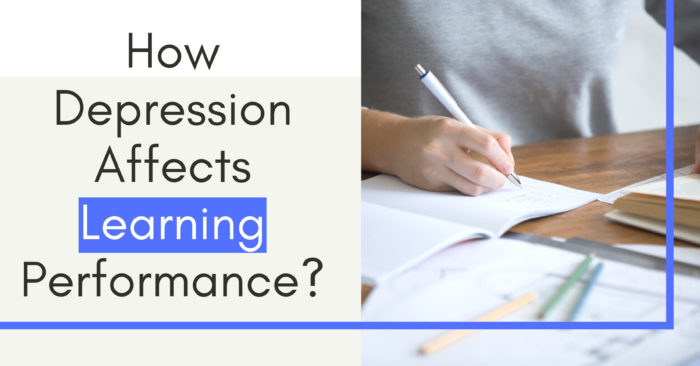How Depression Affects Learning Performance?
Depression is much more than a sad feeling; it is a transformed state of mind that impacts physical functioning. This can cause changes in brain chemicals that can affect the whole body. At times, the reverse is true. Some kinds of depression can be caused by brain chemistry changes and don’t have anything to do with situations in a children’s life.
Another mental disorders and depressions occur in a range from mild to severe. Mild depressive indications should last at least a year to succeed for a diagnosis of persistent depressive disorder. People with depression cannot complete tasks that need cognitive skills and high-motor; they might also feel vague, chaotic, or easily frustrated. Everyday tasks become can become challenging.
Depression contributes to learning problems and leaves individuals feeling agitated, anxious, irritable, and unable to concentrate. Other people discover that they are no longer interested in activities, hobbies, or learning new things.
Types of Depression
1. Major Depression
It is a type of depression in which a person feels depressed, mostly for days and weeks. Like many mental health conditions, major depression has less to do with what’s happening around. People can have tons of friends, a loving family, and a dream job in this situation. They can have the kind of life that others greed yet still have depression.
There is no apparent reason for major depression; that doesn’t mean it is not real. Major depression is a severe form of depression that has various symptoms.
• Loss of concentration, the inability to making decisions, and memory problems
• Constant feeling of anxiety and worry
• Fatigue and lack of energy
• Gloom, grief, or despair
• Thoughts of death, suicide, or self-harm
• Loss of interest in previously pleasurable activities
• Overeating and lack of appetite
• Unexplained pains and aches
These symptoms may last weeks or months. Some people can have single episodes of major depression, while others may face it throughout their life. Irrespective of how long its symptoms last, major depression can lead to problems in your daily activities and relationships.
2. Persistent Depressive Disorder
If a person encounters depression for more than two years, it is called persistent depressive disorder (PDD), which was initially known as dysthymia (low-grade persistent depression). Persistent depression might not seem as intense as major depression, but it can still drain relationships and make daily tasks challenging.
The symptoms of this type of depression are:
• Lack of interest in things
• Low energy or change of sleep pattern
• Memory problems and concentration issues
• Appetite changes
• Deep hopelessness or sadness
• Social withdrawal
• Failure to feel happiness
• Feeling of guilt
• Difficulty in functioning at work or school
PDD is a long-term type of depression, and the severity of depression symptoms can become less penetrating for months sometimes before getting worse again. People also face episodes of major depression before or while they face persistent depressive disorder; this situation is called double depression. It can last for years; therefore, people with PDD may start to feel like their symptoms are just part of their everyday life.
3. Manic Depression
Manic depression involves periods of mania or hypomania, where people feel delighted, alternating with episodes of depression. Manic depression is an outdated name for bipolar depression. To be diagnosed with bipolar I disorder, a person have to experience an episode of mania that lasts for a week or less if hospitalisation is needed. People may also experience a depressive episode before or following the manic episode.
Depression episodes have some symptoms as major depression.
• Fatigue
• Feelings of emptiness or sadness
• Sleep problems
• Trouble concentrating
• Decreased activity
• Loss of interest and energy
• Suicidal thoughts
Some signs of the manic phase are:
• Reduced sleep
• Racing thoughts and speech
• Unusual, self-destructive, and risky behavior
• Enhanced confidence and self-esteem
• High energy
• Irritability
• Grandiose thinking
• Feeling ecstatic, euphoric, or high
In severe cases, episodes can include delusions and hallucinations. People can have mixed episodes in which they have symptoms of both depression and mania.
Other types of depression include:
4. Perinatal depression
5. Seasonal depression
6. Atypical depression
7. Premenstrual dysphoric disorder
8. Situational depression
9. Depressive psychosis
Depressions Impact On Learning
The risks of untreated depression are the tendency to self-medicate with drugs or alcohol. Symptoms of depression can lead to many issues in a child’s life, including learning and school performance. These are areas where depression may have a significant impact on learning.
1. Anger and Irritability
Children are likely to manifest depression as improved anger and irritability. A typically compliant student can become argumentative with other students or teachers due to depression.
2. Concentration
Depression reduces a child’s skill to concentrate. Concentration problems usually attribute to ADHD; however, some students can actually be depressed or have an anxiety disorder that reduces their concentration ability.
3. Lack of Motivation
Children who feel depressed lose concentration on everything they care about the most. The motivation for schoolwork and college that often is not among the things young people care about most can be the first thing to diminish. Lack of motivation and interest can lead to a lack of productivity, which can cause lower grades.
4. Fatigue
Depression can lead to difficulties like sleeping or sleeping too much. Although, after sufficient sleep, people with depression can feel tired the next morning. Being tired or sleepy in school can affects productivity and concentration.
5. Appetite
Children who face depression lose their hunger cravings. They also eat very little or not having a meal. Their energy and blood sugar levels can also decrease over a day. It is significant for parents and teachers to understand and realise that the effects of depression are far-reaching.
Depression can harmfully impact school performance and also social or family relationships. At its worst, it makes children suicidal. It affects more teens and children than most people are aware of. It is curable, but first, it must be recognised.
How Are Academic Experts Helpful In This Case?
Depression is usually encountered by students nowadays due to their workload and professional and academic burden. Therefore, in such cases, several academic experts are available online who help students in different areas of the subject and provide psychology assignment help. Students can contact these experts to manage their workload and get rid of stress and depression.



